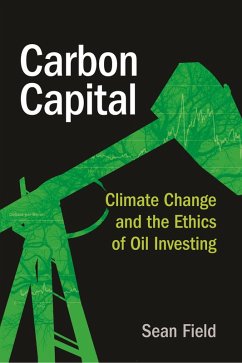Surprising insights into the worldviews of oil and gas financiers
It is no secret that the fossil fuel industry, whose products power modern America both physically and financially, inflicts immense destruction to our environment. The past, present, and future of US energy have been determined not just by engineers, but by financiers, an under-studied group of energy investors.
Drawing on four years of ethnographic work in Houston, Texas, the financial center of the oil industry, Carbon Capital explores how oil financiers decide what a good investment is, and how they incorporate ethics into their decision making. While many who are concerned about climate change see those involved in the gas and oil industries as immoral profit chasers who do not care about the environment, the author finds that this is not the case. His interviews and observations demonstrate that the people who finance the energy industries are actually deeply concerned with ethics. They grapple with questions about climate change and what it means to do the right thing, but the choices they make are ultimately guided by a combination of how they perceive the historical context in which they operate, their faith, which is largely religious Christian; their financial interests; plus the capitalist system in which they are running, all of which come together to shape their moral understandings about what a good energy future looks like. While the worldview of oil financiers may not align with our own, the author argues that given their importance in shaping environmental approaches, it is crucial that we understand what drives their ethical sensibilities.
It is no secret that the fossil fuel industry, whose products power modern America both physically and financially, inflicts immense destruction to our environment. The past, present, and future of US energy have been determined not just by engineers, but by financiers, an under-studied group of energy investors.
Drawing on four years of ethnographic work in Houston, Texas, the financial center of the oil industry, Carbon Capital explores how oil financiers decide what a good investment is, and how they incorporate ethics into their decision making. While many who are concerned about climate change see those involved in the gas and oil industries as immoral profit chasers who do not care about the environment, the author finds that this is not the case. His interviews and observations demonstrate that the people who finance the energy industries are actually deeply concerned with ethics. They grapple with questions about climate change and what it means to do the right thing, but the choices they make are ultimately guided by a combination of how they perceive the historical context in which they operate, their faith, which is largely religious Christian; their financial interests; plus the capitalist system in which they are running, all of which come together to shape their moral understandings about what a good energy future looks like. While the worldview of oil financiers may not align with our own, the author argues that given their importance in shaping environmental approaches, it is crucial that we understand what drives their ethical sensibilities.
Dieser Download kann aus rechtlichen Gründen nur mit Rechnungsadresse in A, D ausgeliefert werden.









